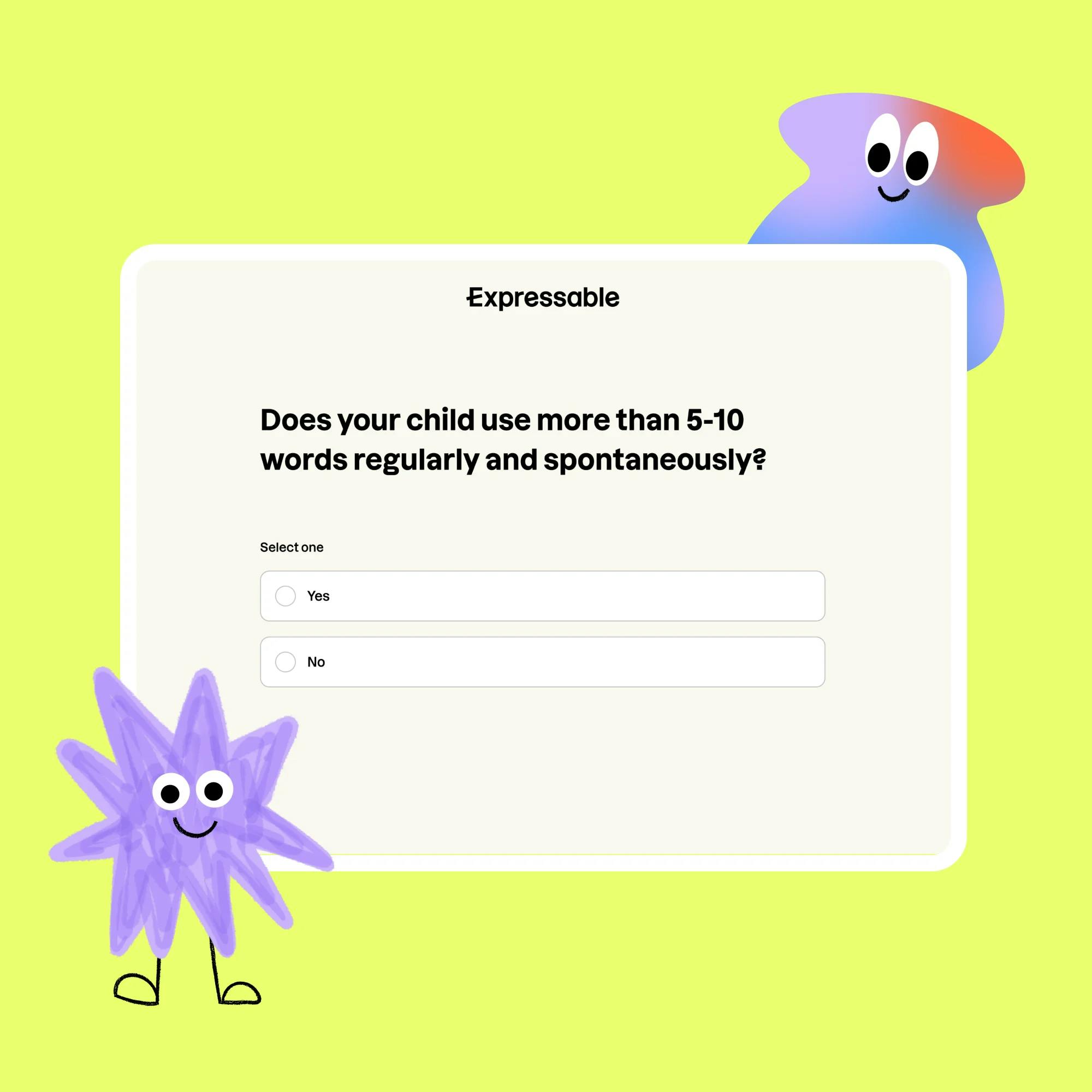
What Age Should Children Begin Speech Therapy?
 Alexis Irazoque, M.S., CCC-SLP
Alexis Irazoque, M.S., CCC-SLP
"At what age should my child start speech therapy?" This is a question that speech therapists hear often! Many parents and caregivers are understandably concerned about their young child’s speech and language development. But how do you know if your child is a "late bloomer" or could benefit from speech therapy?
Curious or concerned?
Our free screener is tailored by age and covers all areas of speech, language, and feeding. Find out if your child might need speech therapy.
 Screener for children
Screener for childrenWhen should you consider starting speech therapy?
The short answer is that if your child is struggling to reach age-appropriate milestones, the earlier speech therapy starts, the better.
Think about how much a child changes in the first few years of life. They not only grow physically, but also cognitively and emotionally.
The stages of language development are universal among children. Language emerges from the moment they’re born. They cry to express their needs, then coo and babble, make gestures, and eventually say their first words.
If your child is struggling with language, it can put them at risk of falling further behind. It can potentially impact their academic success as well as emotional and social well-being. That’s why it’s so important to speak with your pediatrician or a speech therapist to see whether your child is on track or needs support.
Why is speech therapy for children so important?
Speech therapy is about enabling children to express their wants and needs, navigate the world around them, and interact with others.
While some parents may believe that taking a “wait and see” approach is best, research shows that early intervention for speech and language sets kids up for communication success. It can help promote early literacy skills, improve a child’s cognitive abilities like problem-solving and attention, and improve academic achievement once they begin school.


Communication is also linked to behavior. In fact, unwanted behaviors like tantrums often are related to a child’s inability to communicate. Helping them learn to express themselves can go a long way in this area.
Addressing concerns earlier can also reduce any issues related to delays in speech and language. Early intervention for speech and language has been shown to reduce the need for special education later in a child’s life. It can save a family costs of therapeutic interventions in the long run.
How to tell if your child needs speech therapy
As mentioned, language skills begin developing from the moment your child is born--and long before they’ve said those memorable first words.
It’s important to be aware of how your child’s language is progressing, as many parents wait too long before starting intervention. If you have any concerns, a good first step is to take our easy online screener to see if a speech and language evaluation is recommended.
The links below outline what age-appropriate milestones a typically developing child should meet, and what signs to look for that mean they may need professional help:


A few causes for concern for early language learners include:
0-3 months:
Lack of responsiveness
Lack of awareness of their environment
Cry does not change if tired, hungry, or in pain
3-6 months:
Can't focus or is easily over-stimulated
Lacks awareness of sound; doesn't focus on the source of the sound or speaker
Limited awareness of people and objects in the environment
6-9 months:
Does not appear to enjoy the social rewards of interaction
Lacks connection with adults, such as eye contact, reciprocal eye gaze, vocal turn-taking, and reciprocal social games like peek-a-boo
Doesn't babble, or their babbling contains few or no consonants
9-12 months:
Is easily upset by sounds that are not upsetting to others
Does not clearly ask for objects while focusing on them
Doesn't respond to language or use communicative gestures, such as waving


As you can see, many vital speech and language skills emerge in that first year. The demands of language increase in your child’s second year. Age 2 is typically when children begin to say their first true words, verbally request objects, put two words together, and use at least 50 words to request, comment, and label. If your child is not meeting these milestones, it’s a good idea to speak with a speech therapist.
Another sign to look for is how your child is producing specific speech sounds.
During the first few years of life, children begin experimenting with sounds and using them in words. While we typically don't begin to treat speech sound disorders until the age of 3, it’s important to note that trouble producing accurate speech sounds may be a sign of a speech disorder. Be on the lookout for whether your child:
Says /p/, /b/, /m/, /h/, and /w/ incorrectly in words (ages 1-2 years)
Says /k/, /g/, /f/, /t/, /d/, and /n/ incorrectly in words (ages 2-3 years)
Produces speech that is unclear, even to familiar people (ages 2-3 years)

How can a speech therapist help?
If your child had a hard time climbing into their chair, you’d help them up. Seeking help with speech and language is similar. It’s about giving your child the support they need so they don’t have to play “catch up” later on.
When you seek professional help early, your child has a better chance of meeting those important early developmental milestones.
Speech-language pathologists, more commonly referred to as speech therapists, are licensed and qualified experts who work with families to prevent, evaluate, diagnose, and treat a range of issues. Those include speech, language, social communication, cognitive communication, voice, feeding and swallowing, and more.
Every child is different. Working with you and your family, your speech therapist will evaluate your child’s needs and develop an individual treatment plan based on their clinical observations. This treatment plan will consist of short- and long-term goals tailored to your child. During each speech therapy session, your therapist will use fun and interactive games and activities that help your child make progress toward these goals.


Why parents are key to their child’s speech therapy success
Depending on your child’s diagnosis and care plan, your speech therapist will recommend how often speech therapy sessions should occur. They may suggest attending speech therapy once or twice a week.
Now, imagine that you were trying to learn a new skill. Let’s say it’s playing tennis or a musical instrument. How much progress could you make if you were only attending classes once a week, with no practice happening at home, on your own time?
This is all to say, what happens during the speech therapy session itself is just as important as what happens at home. Progress happens when these important skills are practiced throughout the week, reinforced by the person your child loves and spends time with the most--you!
What happens during the speech therapy session is just as important as what happens at home.
Research has consistently shown that the more parents are active participants in their child’s speech therapy, the more progress children make toward their goals. That’s why it’s so important to find a speech therapist that can teach you how to practice speech and language with your child at home, during daily routines.
Practice isn’t hard, and it doesn’t require hours of drills or special activities. It’s simply about making small but purposeful changes in how you already interact with your child--whether it’s eating breakfast together or preparing for bedtime--and using those times to promote language growth.


The benefits of online speech therapy
As we discussed, caregivers play a vital role in their child’s communication success. And the role of your speech therapist, especially if you have a young child, should be about empowering and educating you on how to use communication strategies in your child’s everyday life.
With that said, it can be hard for parents to develop strong relationships with their speech therapist and learn from them directly. This is especially true if speech therapy happens at school, or if you drop your child off at a therapy clinic.
That’s why online speech therapy is so effective. It takes the pressure off you to travel to appointments or adapt your child’s schedule to fit in speech therapy sessions. With the click of a button, you and your child can speak directly with your speech therapist at a time that’s convenient for the entire family. This all happens at home, where children are often most comfortable and motivated to learn.


Online speech therapy works for all ages, even toddlers. It’s no secret that squirmy kiddos can have trouble paying attention for extended periods of time, whether on a computer or working with a therapist in an in-person setting. However, receiving speech therapy virtually allows you to “be in the room” with your child and speech therapist. You're both learning from your therapist, and you're using your child’s favorite toys and activities during therapy to promote skill building.
Afterward, you’ll be better prepared to carry over these new techniques, lessons, cues, and corrections into your normal daily interactions with your child, giving them the best shot at success!
How Expressable Can Help
Concerned your child isn't reaching age-expected milestones? Looking for communication support from a professional? Expressable is a national online speech therapy practice serving children and adults. We treat all major areas of communication and feeding, offer flexible hours including evenings and weekends, and accept most major health insurance plans. We’re proud to have earned more than 3,000 5-star reviews from our clients (4.9/5 average).
Our therapy model is centered on parent and caregiver involvement. Research proves that empowering caregivers to participate in their loved one’s therapy leads to better outcomes. That’s why we combine live, 1-on-1 speech therapy with personalized education and home practice activities for faster progress.
Communication is more than words. It’s how we share how we feel and show who we are. We’re here to help you or your child do just that.














